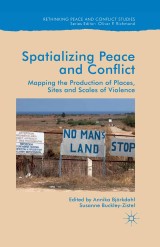Details

Spatialising Peace and Conflict
Mapping the Production of Places, Sites and Scales of ViolenceRethinking Peace and Conflict Studies
|
CHF 59.00 |
|
| Verlag: | Palgrave Macmillan |
| Format: | |
| Veröffentl.: | 01.05.2016 |
| ISBN/EAN: | 9781137550484 |
| Sprache: | englisch |
Dieses eBook enthält ein Wasserzeichen.
Beschreibungen
<p>This volume brings to the fore the spatial dimension of specific places and sites, and assesses how they condition – and are conditioned by – conflict and peace processes. By marrying spatial theories with theories of peace and conflict, the contributors propose a new research agenda to investigate where peace and conflict take place.</p>
PART I: TERRITORIALITIES AND SCALES<br>1. Overcoming the Material/Social Divide: Conflict Studies from the Perspective of Spatial Theory; Sven Chojnacki and Bettina Engels<br>2. Territoriality in Civil War: The Ignored Territorial Dimensions of Violent Conflict in North Kivu, DR Congo; Martin Doevenspeck<br>3. Armed Conflict and Space: Exploring Urban-Rural Patterns of Violence; Kristine Höglund, Erik Melander, Margareta Sollenberg and Ralph Sundberg<br>PART II: GLOBAL AND LOCAL<br>4. Reading Urban Landscapes of War and Peace: The Case of Goma, Democratic Republic of the Congo; Karen Büscher<br>5. The Camp, the Street, the Hotel, and the Brothel — the Gendered, Racialised Spaces of a City in Crisis: Dili, 2006-2008; Henri Myrttinen<br>6. Local Agency in 'Global' Spaces? The engagement of Iraqi women's NGOs with CEDAW; Annika Henrizi<br>PART III: BOUNDARIES AND BORDERS<br>7. Space, Class and Peace: Spatial Governmentality in Post-War and Post-Socialist Bosnia and Herzegovina; Elena B. Stavrevska<br>8. Bluffing the State: Spatialities of Contested Statehood in the Abkhazian-Georgian Conflict; Jolle Demmers and Mikel Venhovens<br>9. Urban Space as an Agent of Conflict and 'Peace': Marginalised Im/mobilities and the Predicament of Exclusive-Inclusion among Palestinians in Tel Aviv; Andreas Hackl<br>10. Reframing the Olympic Games as a Space of Contestation Rather than a Fixed Place: Uncovering New Spatial Stories of (De)Securitisation; Faye Donnelly<br>PART IV: PLACES AND SITES <br>11. Where Conflict and Peace Take Place: Memorialisation, Sacralisation and Post-Conflict Space; Laura Michael, Brendan Murtagh and Linda Price<br>12. Seeing and Unseeing the Dome of Rocks: Conflict, Memory, and Belonging in Jerusalem; Nina Fischer<br>13. Belfast, 'The Shared City'? Spatial Narratives of Conflict Transformation; Milena Komarova and Liam O'Dowd<br>14. Geographies of Crime and Justice in Bosnia and Herzegovina; Zala Vol?i? and Olivera Simi?<br> <br><br><br><br><br> <br><br><br> <br><br><br> <br><br> <br><br> <br><br> <br><br>
<p>Annika Björkdahl is Professor at Lund University and the Editor-in-Chief of Cooperation and Conflict. She researches peacebuilding, gender and transitional justice. Her publications include Rethinking Peacebuilding (2013) and articles in Security Dialogue, Millennium, Human Rights Review, and Journal of European Public Policy.<br><br>Susanne Buckley-Zistel is Professor for Peace Conflict Studies and Director of the Center for Conflict Studies, Marburg University, Germany, and Senior Fellow at the Käte Hamburger Kolleg for Global Cooperation Research at the University Duisburg-Essen, Germany. Her research focuses on issues pertaining to peace and conflict, violence, gender and transitional justice.</p>
<p>There has been no sustained inquiry into the relationship linking peace and conflict with space and place. This innovative edited volume explores conflict and peace through spatial approaches, and proposes a new research agenda investigating where peace and conflict take place. All chapters employ space as an analytic category and develop strong theoretical contributions alongside new empirical insights. From battlefields to memorials, places of encounter shape how agents relate to each other and how their actions are enabled or constrained. Moreover, spaces such as the international peacekeepers camps or sites of atrocity would not exist if it were not for the conflict. Drawing on concepts such as spatial governmentality, scalar politics, relational spatial theory and spatial narratives the authors investigate case studies reaching from divided cities such as Belfast, Dili and Jerusalem, via rape camps and karaoke bars, to war-torn countries.</p>
Provides new and important insights into processes of peace and the dynamics of conflict as situated within and constitutive of different spaces and places Sits at the intersection of peace and conflict, urban studies, geography and human geography, border studies and development studies Presents cases and material from global comparatives studies of Northern Ireland to the Middle East
<p>“<i>Spaitalizing Peace and Conflict</i> is a timely and impressive volume that explores the complex and co-constitutive relations between peace and conflict, and space and place. ... The volume brings together scholars from an impressively wide range of disciplines who draw on diverse methods and methodologies, from quantitative analysis of large data sets to narrative analysis and ethnography. This is a refreshing and productive approach which balances diversity with coherence ... . In sum, this is an innovative, informative and engaging volume that will be an excellent resource for researchers and students of peace from a wide range of disciplinary backgrounds.” (Dr Fiona McConnell, University of Oxford)</p>
Diese Produkte könnten Sie auch interessieren:

Inclusión educativa de niños, niñas y adolescentes migrantes venezolanos, en Colombia

von: Douglas Jiménez

CHF 16.00
















